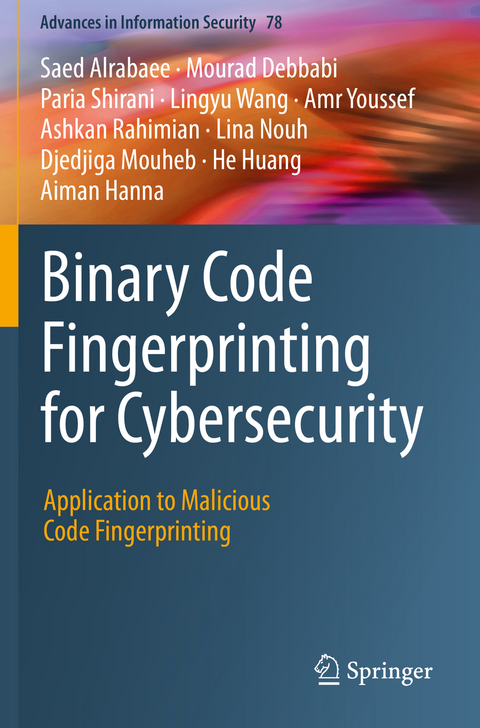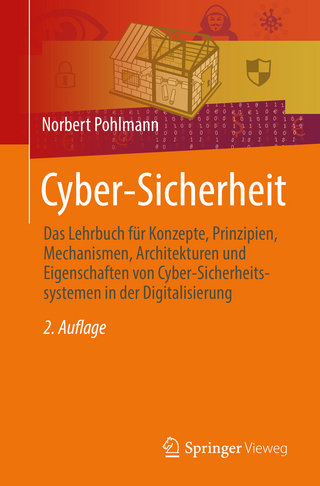
Binary Code Fingerprinting for Cybersecurity
Springer International Publishing (Verlag)
978-3-030-34240-1 (ISBN)
This book also introduces several innovative quantitative and qualitative techniques that synergistically leverage machine learning, program analysis, and software engineering methods to solve binary code fingerprinting problems, which are highly relevant to cybersecurity and digital forensics applications. The above-mentioned techniques are cautiously designed to gain satisfactory levels of efficiency and accuracy.
Researchers working in academia, industry and governmental agencies focusing on Cybersecurity will want to purchase this book. Software engineers and advanced-level students studying computer science, computer engineering and software engineering will also want to purchase this book.
lt;b>Saed Alrabaee is an Assistant Professor at the Department of Information Systems and Security in United Arab Emirates University (UAEU). Prior to joining UAEU, Dr. Alrabaee was a Visiting Assistant Professor at the Department of Electrical and Computer Engineering and Computer Science at the University of New Haven (UNH), US. Dr. Alrabaee holds a Ph.D. degree in information system engineering from Concordia University in Montreal, Canada, which was executed under the supervision of Prof. Mourad Debbabi and Prof. Lingyu Wang. His research interests focus on the broad area of cybersecurity, reverse engineering, including, binary authorship attribution and characterization, malware analysis, and function fingerprinting.
Mourad Debbabi is a Full Professor at the Concordia Institute for Information Systems Engineering (CIISE) and Associate Dean Research and Graduate Studies at the Gina Cody School of Engineering and Computer Science. He holds the NSERC/Hydro-Québec Thales Senior Industrial Research Chair in Smart Grid Security and the Concordia Research Chair Tier I in Information Systems Security. He is also the President of the National Cyber Forensics and Training Alliance (NCFTA) Canada, and a member of CATAAlliance's Cybercrime Advisory Council. He is the founder and one of the leaders of the Security Research Centre at Concordia University. Dr. Debbabi holds Ph.D. and M.Sc. degrees in computer science from Paris-XI Orsay, University, France. He published 3 books and more than 260 peer-reviewed research articles in international journals and conferences on cybersecurity, cyber forensics, privacy, cryptographic protocols, threat intelligence generation, malware analysis, smart grid security, reverse engineering, specification and verification of safety-critical systems, programming languages and type theory. He supervised to successful completion of 30 Ph.D. students and more than 70 Master students.
Paria Shirani is a PhD candidate at the Concordia Institute for Information Systems Engineering (CIISE) at Concordia University under the supervision of Dr. Mourad Debbabi and Dr. Lingyu Wang. Paria received the National Science and Engineering Research Council (NSERC) Postdoctoral Fellowships, the most prominent postdoctoral award. During her PhD, she was awarded with Fonds de recherche du Québec - Nature et technologies (FRQNT) Scholarship. Paria is currently a member at the Security Research Center at Concordia University, and has been actively working on different topics of cybersecurity, such as software fingerprinting for automated malicious code analysis and smart grid security. Her research interests are in the fields of malware analysis, IoT security, vulnerability detection, network security, and big data analysis.
Lingyu Wang is a Professor at the Concordia Institute for Information Systems Engineering (CIISE) at Concordia University, Montreal, Canada. He received his Ph.D. degree in Information Technology in 2006 from George Mason University. His research interests include cloud computing security, SDN/NFV security, security metrics, software security, and privacy. He has co-authored five books, two patents, and over 120 refereed conference and journal articles at reputable venues including TOPS, TIFS, TDSC, TMC, JCS, S&P, CCS, NDSS, ESORICS, PETS, ICDT, etc.
Amr Youssef is a professor at the Concordia Institute for Information Systems Engineering (CIISE). He received his B.Sc. and M.Sc. degrees from the Department of Electronics and Communications Engineering, Cairo University, Egypt, in 1990 and 1993, respectively, and the Ph.D. degree from the Electrical and Computer Engineering Department, Queens University, Canada, in 1997. Before joining Concordia in 2004, Dr. Youssef worked for Nortel Networks, the Center for Applied Cryptographic Research at the University of Waterloo, IBM, and Ca
1 Introduction.- 2 Binary Analysis Overview.- 3 Compiler Provenance Attribution.- 4 Library Function Identification.- 5 Identifying Reused Functions in Binary Code.- 6 Function Fingerprinting.- 7 Free Open-Source Software Fingerprinting.- 8 Clone Detection.- 9 Authorship Attribution.- 10 Conclusion.
| Erscheinungsdatum | 16.03.2021 |
|---|---|
| Reihe/Serie | Advances in Information Security |
| Zusatzinfo | XXI, 249 p. 78 illus., 32 illus. in color. |
| Verlagsort | Cham |
| Sprache | englisch |
| Maße | 155 x 235 mm |
| Gewicht | 421 g |
| Themenwelt | Informatik ► Netzwerke ► Sicherheit / Firewall |
| Schlagworte | authorship attribution • Binary Code Analysis • Compiler Provenance Fingerprinting • cybersecurity • digital forensics • Free Open-source Software Fingerprinting • Function Clone Detection • Function Fingerprinting • Library Function Identification • malware analysis • Program Provenance Analysis • Reused Function Identification • Reverse Engineering • Software Fingerprinting • Static Binary Analysis • Vulnerability Fingerprinting • Vulnerability Research |
| ISBN-10 | 3-030-34240-9 / 3030342409 |
| ISBN-13 | 978-3-030-34240-1 / 9783030342401 |
| Zustand | Neuware |
| Informationen gemäß Produktsicherheitsverordnung (GPSR) | |
| Haben Sie eine Frage zum Produkt? |
aus dem Bereich


